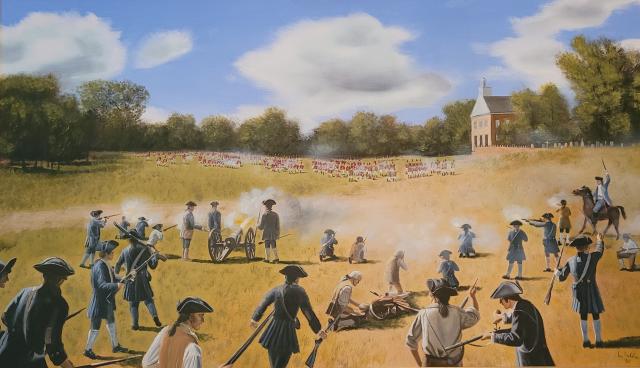Kean Historians Lead New Research into Revolutionary War Battles

An artist's depiction of the Battle of Connecticut Farms, fought in what is now Union.
Kean University researchers are taking a fresh look at New Jersey Revolutionary War history, using modern mapping techniques, original documents and more to develop a fuller understanding of two pivotal battles fought near Kean.
With the 250th anniversary of the founding of the United States coming up in 2026, a team including historians from Kean and Monmouth universities launched a new review of the battles of Connecticut Farms and Springfield. The conflicts were fought in June 1780 near what is now Kean’s Union campus.
As part of their focus, researchers are exploring the roles of women, Blacks and Native Americans during the two conflicts, the last major Revolutionary War confrontations in New Jersey.
“As we approach the 250th anniversary of the signing of the Declaration of Independence, we proposed doing a new investigation of the battles. We have some myths; we have some stories. We hope to take advantage of new technologies and conduct a new historic review,” said Kean Acting Dean of the College of Liberal Arts Jonathan Mercantini, Ph.D., co-lead of the project.
British soldiers marched through what is now Kean, passing Liberty Hall, and fought the Continental Army on June 7, 1780 in Connecticut Farms, now Union Township. The Battle of Springfield occurred two weeks later.
Union County memorializes this history in the county seal, which depicts the death of Hannah Caldwell, a minister’s wife shot during the Battle of Connecticut Farms.
Researchers will use GPS technology to plot battle sites and geographic locations, and archaeological techniques to look deeper into the conflicts.
Researchers are planning a public event in June to share findings.The three-year project includes developing new signs, an audio self-driving tour in multiple languages, and K-12 educational activities. The researchers also hope to make new historic research accessible as well.
“We hope to share our research with the widest possible public audience, to make this scholarly work relevant to the region and beyond,” Mercantini said. “The location of the sites in what are now diverse communities presents an opportunity for engaging a diverse audience.”
The project received an $18,550 grant from the New Jersey Historical Commission.
Kean honors history alumnus Nicole Skalenko ’20, now a Rutgers-Camden graduate student, is conducting research with historic documents including orderly books – records kept by military leaders in both armies – as well as 18th century newspapers and translations of Hessian soldiers’ diaries. Hessians were German troops hired to fight for the British.
Earlier published research focused on prominent military leaders, Skalenko said, without considering women and other people.
“It became increasingly evident there were other individuals who held important roles during these battles, and their service should be recognized as well,” she said. “I think this perspective is really important.”
Skalenko found one interesting entry in a Hessian soldier’s journal. The soldier wrote that it was impossible to surprise Continental Army forces because civilian homes in the area served as “advertising posts,” and farm families, including wives, daughters and servants, notified Continental regiments of Hessian movements.
“The battles deserve a closer look,” she said.
Richard Veit, Ph.D., interim dean of the School of Humanities and Social Sciences at Monmouth University, is a co-lead on the project. Also on the team from Monmouth are Geoffrey Fouad, Ph.D., an associate professor of geography; Melissa Ziobrio, a specialist professor of public history; and student Matthew Kramer.